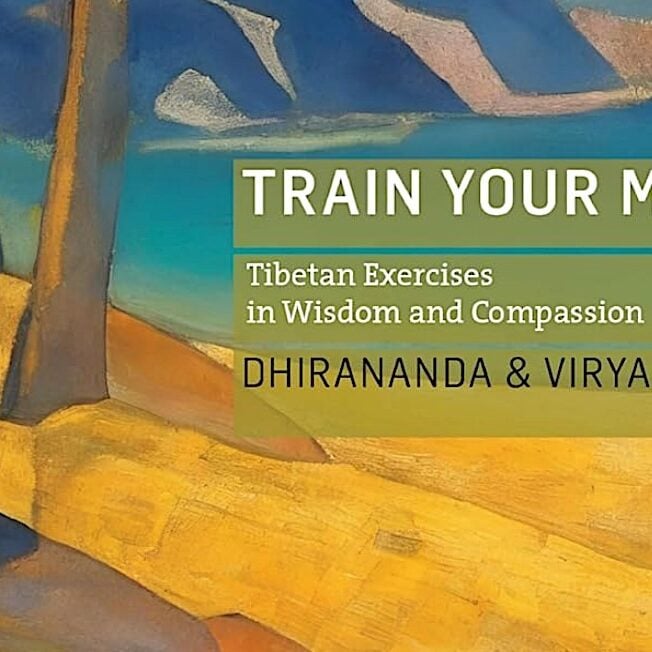Book Excerpt from: Train Your Mind: Tibetan Exercises in Wisdom and Compassion

By Dhirananda & Viryabodhi
Book Excerpt
At This Crucial Time, Practise the Essentials
The traditional Buddhist view is that we have lived an infinite number of lives before this one. In the vast majority of them, we probably didn’t have the opportunity to practise the Dharma. This crucial time is now, in this life. We have met the Dharma, and we can practise it. Just the fact that we are learning about lojong and training in compassion presents us with a unique opportunity that most living beings that have so far existed have not had.
But we can also see that we are at a crucial time for humanity and for our planet. We have unique access to the accumulated knowledge and experience of humanity and to liberating teachings such as lojong. At the same time, many of us have the material conditions necessary for an effective practice. But we don’t know how long it will last. There are many threats to our welfare, to our freedom as individuals, and to our collective survival. We have a window of opportunity right now, but we do not know for how long.
Now that we have the opportunity, we would be foolish not to practise what is most essential. Firstly, our practice is more essential than theoretical knowledge and learning. It is good to read books, but better still to meditate on the content and meaning of the teachings.
Of all good and valuable knowledge, the most important is bodhicitta. Of all the Buddha’s teachings, the teaching on compassion is the most important. So this time, when we have the opportunity, let us practise bodhicitta.

The Nature of Awareness: Openness, Clarity, and Sensitivity
A traditional way to explore the nature of awareness is to become aware of its three inherent qualities. By becoming aware of these qualities, they grow and emerge more clearly.
The first quality is openness. Awareness does not have a specific place in space, it is intangible and therefore completely open. Examine this openness. For example, you can be open to all the experiences you have, all the sensations and impressions that arise
and flow in through your sense organs. Notice how it feels to be open in this way, open, for example, to all sounds. Stop and just listen. Can you be open and receptive to all sounds? What effect does this have on your body?
The second quality is clarity. When you become aware of something, say the sight of a flower, a person in front of you, or a striking colour or shape in your vicinity, you find that it becomes clearer, brighter, in the light of awareness. There is a clear knowing – this is my experience. Touch this clarity, feel it within you, notice its quality in your mind and heart.
The third and final quality is sensitivity, which is the responsive, emotional side of awareness. You can also think of it as warmth or kindness or even love – try it out and see how you experience it. As you sit here reading, take a moment to listen inwardly and feel your inner experience, rest your attention in your heart, in your centre, and see if you can find a warmth there, a gentle care, a kindness. What’s it like to sit with this quality?
Like the other qualities, sensitivity is inherent. It is always there, but we can lose touch with it when we, for example, become stressed or too mentally preoccupied with our tasks or chores. Like the other qualities, it grows and becomes more apparent the more we pay attention to it and recognize it in our experience.
Sit for a while and play with these three qualities. Notice them in your body, in the experience of breathing, in your thoughts, and so on. You can always come back to these three qualities because they are always there, to some extent.

Synopsis of Train Your Mind
More articles by this author

The Five Hindrances and the Flow of Experience: Excerpt from Integral Vipissana: Mindfulness through Psychology, Neuroscience, and the Satipatthana Sutta

Illumination: A Guide to the Buddhist Method of No-Method — book excerpt by Rebecca Li Ph.D “What Silent Illumination Is”
Search
Latest Features
Please support the "Spread the Dharma" mission as one of our heroic Dharma Supporting Members, or with a one-time donation.
Please Help Support the “Spread the Dharma” Mission!

Be a part of the noble mission as a supporting member or a patron, or a volunteer contributor of content.
The power of Dharma to help sentient beings, in part, lies in ensuring access to Buddha’s precious Dharma — the mission of Buddha Weekly. We can’t do it without you!
A non-profit association since 2007, Buddha Weekly published many feature articles, videos, and, podcasts. Please consider supporting the mission to preserve and “Spread the Dharma." Your support as either a patron or a supporting member helps defray the high costs of producing quality Dharma content. Thank you! Learn more here, or become one of our super karma heroes on Patreon.
Lee Kane
Author | Buddha Weekly
Lee Kane is the editor of Buddha Weekly, since 2007. His main focuses as a writer are mindfulness techniques, meditation, Dharma and Sutra commentaries, Buddhist practices, international perspectives and traditions, Vajrayana, Mahayana, Zen. He also covers various events.
Lee also contributes as a writer to various other online magazines and blogs.
















